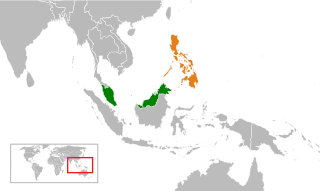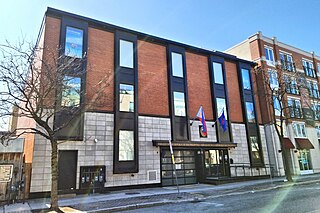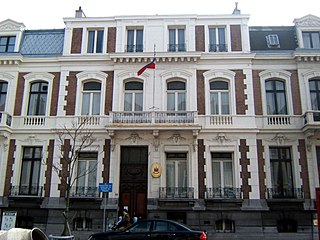
Malaysia is an active member of various international organisations, including the Commonwealth of Nations, the United Nations, the Organisation of Islamic Cooperation, and the Non-Aligned Movement. It has also in recent times been an active proponent of regional co-operation.

Malaysia–Philippines relations refers to the bilateral relations between Malaysia and the Philippines. The Philippines has an embassy in Kuala Lumpur, and Malaysia has an embassy in Manila and a consulate general in Davao City. The people of the two neighbouring countries have a long history of cultural and political relations.

Cuba and the Philippines were both former Spanish colonies. Spanish rule on both countries was ended by the victory of the United States in the Spanish–American War as provisions of the Treaty of Paris giving Cuba independence and the Philippines becoming a new possession of the United States.

The bilateral relations of the Philippines and Ukraine began with a formal agreement in 1992. Neither country has a resident ambassador. Ukraine has a non-resident ambassador in Kuala Lumpur, Malaysia. The Philippines is represented by its embassy in Warsaw, Poland.

The Embassy of the Philippines in Bandar Seri Begawan is the diplomatic mission of the Republic of the Philippines to the Sultanate of Brunei. Opened in 1984 after Brunei gained independence from the United Kingdom, it is currently located in the Diplomatic Enclave of Bandar Seri Begawan, behind the offices of the country's Ministry of Culture, Youth and Sports.

The Embassy of the Philippines in Madrid is the diplomatic mission of the Republic of the Philippines to the Kingdom of Spain. Opened in 1951, it is located at the corner of Calle Eresma and Calle Guadalquivir in the barrio (neighborhood) of El Viso, part of the district of Chamartín in northern Madrid, where it has been since 1998.

The Embassy of the Philippines in Stockholm is the diplomatic mission of the Republic of the Philippines to the Kingdom of Sweden. It is located on the island of Lidingö in Stockholm County, east of Stockholm city proper. Although the current embassy dates from 2020, the Philippines also maintained a previous resident embassy in Sweden between 1978 and 2012.

The Embassy of the Philippines in Ottawa is the diplomatic mission of the Republic of the Philippines to Canada. Opened in 1971, it is currently located at 30 Murray Street in the ByWard Market neighborhood of central Ottawa, roughly between the U.S. and Danish embassies.
The Embassy of the Philippines in Jakarta is the diplomatic mission of the Republic of the Philippines to the Republic of Indonesia. It is currently located at 8 Imam Bonjol Street in the Menteng district of Central Jakarta, near significant city landmarks like the Formulation of Proclamation Text Museum and Taman Suropati.

The Embassy of the Philippines in Beirut is the diplomatic mission of the Republic of the Philippines to the Republic of Lebanon. Opened in 1996, it is currently located at the W Building on Rue Mar Geries in the southern Beirut suburb of Hadeth, part of the Baabda District in the Mount Lebanon Governorate.

The Embassy of the Philippines in Copenhagen is the diplomatic mission of the Republic of the Philippines to the Kingdom of Denmark. Opened in 2019, it is located at the first floor of 13 Arne Jacobsen Avenue in the Ørestad district of Copenhagen, near Ørestad Station and opposite the Field's shopping mall.

The Embassy of the Philippines in Oslo is the diplomatic mission of the Republic of the Philippines to the Kingdom of Norway. Opened in 2007, it is currently located along Nedre Vollgate in central Oslo, near Kontraskjæret and the Akershus Fortress.

The Embassy of the Philippines in Cairo is the diplomatic mission of the Republic of the Philippines to the Arab Republic of Egypt. Opened in 1960, it is currently located in the southern Maadi district of Cairo, near the Cairo American College.

The Embassy of the Philippines in Berlin is the diplomatic mission of the Republic of the Philippines to the Federal Republic of Germany. First opened in 1955 as the mission to West Germany, it is currently located in the Mitte locality of central Berlin, just beyond the periphery of the Reichstag complex and near the Charité.

The Embassy of the Philippines in The Hague is the diplomatic mission of the Republic of the Philippines to the Kingdom of the Netherlands. First opened in 1959, it is located in the Archipelbuurt neighborhood of The Hague's city center, where it has been since 1968.

The Embassy of the Philippines in Rome is the diplomatic mission of the Republic of the Philippines to the Italian Republic. First opened in 1947, it is currently located along the Via Aurelia in the quarter (quartiere) of Aurelio, part of Municipio XIII in western Rome, just west of Vatican City.

The embassy of the Philippines in Paris is the diplomatic mission of the Philippines to France.

The Consulate General of the Philippines in Honolulu is a diplomatic mission of the Republic of the Philippines in the United States, representing the country's interests in Hawaii. Opened in 1946, it is located along Hawaii Route 61 in the Nuʻuanu neighborhood of northern Honolulu, next to the campus of the Hawaii Baptist Academy.



















